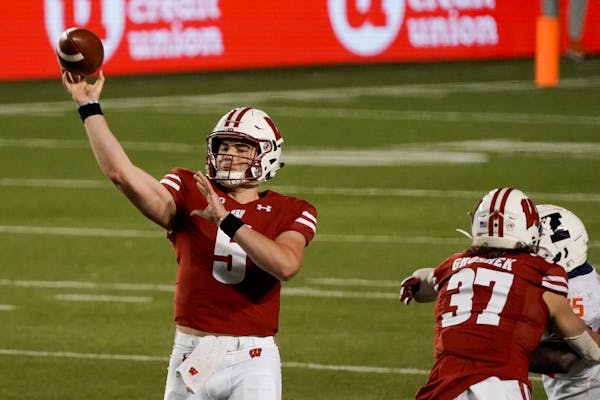Five days after opening the long-awaited Big Ten football season with a flourish, the Wisconsin Badgers had their program screech to a halt Wednesday, canceling this week's game at Nebraska because of a quickly spreading COVID-19 outbreak.
The Badgers paused all team activities for seven days and announced they've had 12 positive coronavirus tests, including for head coach Paul Chyrst. Also reported as testing positive is Graham Mertz, the redshirt freshman quarterback who tossed five touchdown passes in last week's 45-7 victory over Illinois.
"We had to make this decision to get our arms around this and control the virus now before it got out of hand," Badgers athletic director Barry Alvarez explained on a video conference call.
The Wisconsin/Nebraska game is the 37th from the Football Bowl Subdivision to get postponed or canceled this season, so this has been a national trend. But the Badgers' and Cornhuskers' plight hits close to home for the Gophers, since all three teams are in the Big Ten West.
"We have had a lot of discussions to prepare ourselves for a scenario that would be similar to what happened with Wisconsin," Gophers offensive coordinator Mike Sanford Jr. said. "You know, it's just what you have to deal with in 2020."
Alvarez and UW-Madison chancellor Rebecca Blank made the decision to cancel Saturday's game in consultation with the Big Ten. Alvarez said the Badgers had just one positive test two days before the Illinois game, but then the count increased.
"We just felt with the number of positives in that short of a timeline, we had an issue," Alvarez said.
The Badgers announced that six players and six staff tested positive within five days. Alvarez said he was also tested, with his results expected Thursday.
Chryst said Wednesday he didn't know and never asked whether Wisconsin's canceled game would be considered a "no contest" and not count in the standings. The Big Ten confirmed to the Star Tribune that it would not count as a win or loss.
The Big Ten established an eight-game regular season, and teams need to play at least six of those contests to qualify for the Big Ten championship game. But if the average number of games played drops, a team could qualify for the title with fewer games. If the average number of games teams play is six, for example, a team could qualify for the title game with four games played.
So, the Badgers aren't out the of mix after being pegged as the favorite to win the Big Ten West again. But there is concern if they can get a handle on the virus with no bye weeks for any team this season.
"I don't confess to be an expert on this," Chryst said. "We don't know if we had one super-spreader. I don't know that. You're absolutely always going to look at how can we be better. What do we need to do? We changed stuff, really at the end of last week."
The Badgers were unclear Wednesday whether their quarantine would end before their next game Nov. 7 vs. Purdue at home. The soonest the Badgers can practice together is Nov. 4, and Big Ten rules state that Chryst must quarantine for 10 days, meaning he can't return until Nov. 6.
It's uncertain who will be Wisconsin's starting QB. Mertz and Chase Wolf were backups to projected starter Jack Coan, who had foot surgery. With Mertz and Wolf reportedly testing positive for COVID-19, keeping them out of game action for 21 days under Big Ten rules, fourth-stringer Danny Vanden Boom would've made his first start on Saturday vs. Nebraska.
The Big Ten uses two key metrics to determine if a team needs to modify its procedures or shut down entirely — the testing positivity rate and population positivity rate. The levels are green, orange and red, and if both metrics come up red, the conference requires a program to shut down for seven days.
Alvarez said the Badgers came in at the orange level in testing positivity rate, which means that between 2% and 5% of the tests the football team administered over a seven-day period came back positive.
More alarming, Alvarez said the Badgers came up red in the population positivity rate, which means that 7.5% or more of the individuals within this testing population — up to 170 members of the football team, counting players and staff — were confirmed as COVID positive during the seven-day span.
This is the second time the Badgers have suspended team activities recently, including a two-week period in September. The Wisconsin State Journal reported that 60 positive COVID-19 tests (56 players and four staff) were linked to the Badgers football team from early June to Monday.
"We just felt like if we want to continue to play through the year," Alvarez said, "it was important to make this move right now."




